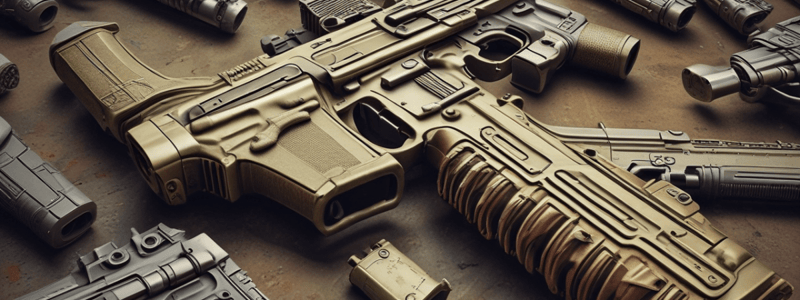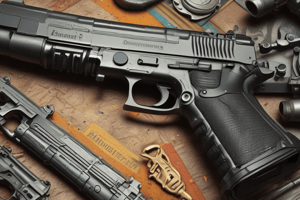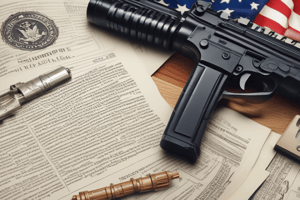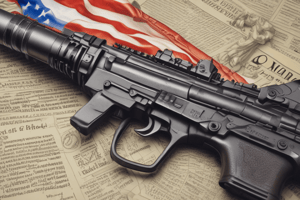Podcast
Questions and Answers
The President is authorized to control the export and import of defense articles and defense services under Section 38 of the Arms Export Control Act.
The President is authorized to control the export and import of defense articles and defense services under Section 38 of the Arms Export Control Act.
True (A)
The statutory authority of the President to promulgate regulations with respect to exports of defense articles and defense services is delegated to the Secretary of Defense.
The statutory authority of the President to promulgate regulations with respect to exports of defense articles and defense services is delegated to the Secretary of Defense.
False (B)
The Deputy Assistant Secretary of State for Defense Trade Controls has the authority to administer the regulations in this subchapter.
The Deputy Assistant Secretary of State for Defense Trade Controls has the authority to administer the regulations in this subchapter.
True (A)
The Under Secretary of State for Arms Control and International Security cannot exercise the authorities administered by the Deputy Assistant Secretary of State for Defense Trade Controls.
The Under Secretary of State for Arms Control and International Security cannot exercise the authorities administered by the Deputy Assistant Secretary of State for Defense Trade Controls.
The Arms Export Control Act only delegates authority to the Secretary of State and no other officials.
The Arms Export Control Act only delegates authority to the Secretary of State and no other officials.
The Assistant Secretary of State for Political-Military Affairs does not have the authority to exercise the authorities administered by the Deputy Assistant Secretary of State for Defense Trade Controls.
The Assistant Secretary of State for Political-Military Affairs does not have the authority to exercise the authorities administered by the Deputy Assistant Secretary of State for Defense Trade Controls.
Items subject to the Export Administration Regulations (EAR) can only be exported with approval from the Department of Commerce.
Items subject to the Export Administration Regulations (EAR) can only be exported with approval from the Department of Commerce.
The U.S. Munitions Import List (USMIL) is administered by the Department of State.
The U.S. Munitions Import List (USMIL) is administered by the Department of State.
A Commodity Jurisdiction Determination Request must be submitted to the Directorate of Defense Trade Controls for consideration.
A Commodity Jurisdiction Determination Request must be submitted to the Directorate of Defense Trade Controls for consideration.
The intended use of an article or service after its export does not influence whether it is subject to export controls.
The intended use of an article or service after its export does not influence whether it is subject to export controls.
Permanent import controls for defense articles are under the jurisdiction of the Secretary of State.
Permanent import controls for defense articles are under the jurisdiction of the Secretary of State.
The Department of Commerce controls the temporary import of defense articles and services.
The Department of Commerce controls the temporary import of defense articles and services.
An exemption can be used to export an item subject to EAR independently, without being accompanied by a defense article.
An exemption can be used to export an item subject to EAR independently, without being accompanied by a defense article.
The President has authority over the temporary import of defense articles and services.
The President has authority over the temporary import of defense articles and services.
The U.S. Munitions List under the Arms Export Control Act includes items controlled by both the Secretary of State and the Attorney General.
The U.S. Munitions List under the Arms Export Control Act includes items controlled by both the Secretary of State and the Attorney General.
Items subject to EAR can only be exported with a license or approval from the Department of State.
Items subject to EAR can only be exported with a license or approval from the Department of State.
The provisions of this subchapter apply to articles in Category VI, Category XV, Category XVI, and Category XX of § 121.1 of this subchapter.
The provisions of this subchapter apply to articles in Category VI, Category XV, Category XVI, and Category XX of § 121.1 of this subchapter.
Nuclear related controls fall under the jurisdiction of the Department of Commerce.
Nuclear related controls fall under the jurisdiction of the Department of Commerce.
The transfer of materials involving Restricted Data or assistance related to nuclear weapons is generally prohibited.
The transfer of materials involving Restricted Data or assistance related to nuclear weapons is generally prohibited.
Export licenses for defense articles in Category VI(e) can be granted without the need for an existing Agreement for Cooperation for Mutual Defense Purposes.
Export licenses for defense articles in Category VI(e) can be granted without the need for an existing Agreement for Cooperation for Mutual Defense Purposes.
The President is not authorized to control the export and import of defense articles and defense services.
The President is not authorized to control the export and import of defense articles and defense services.
The authority to promulgate regulations with respect to exports is delegated to the Secretary of Defense by Executive Order 13637.
The authority to promulgate regulations with respect to exports is delegated to the Secretary of Defense by Executive Order 13637.
The Deputy Assistant Secretary of State for Defense Trade Controls has the authority to administer the regulations in this subchapter.
The Deputy Assistant Secretary of State for Defense Trade Controls has the authority to administer the regulations in this subchapter.
All authorities administered by the Deputy Assistant Secretary can only be exercised by the Under Secretary of State for Political-Military Affairs.
All authorities administered by the Deputy Assistant Secretary can only be exercised by the Under Secretary of State for Political-Military Affairs.
Nuclear parts of nuclear weapons are considered non-nuclear parts of nuclear weapons systems.
Nuclear parts of nuclear weapons are considered non-nuclear parts of nuclear weapons systems.
The transfer of Restricted Data or assistance related to nuclear weapons systems may not be subject to any prohibitions.
The transfer of Restricted Data or assistance related to nuclear weapons systems may not be subject to any prohibitions.
The Deputy Assistant Secretary of State for Defense Trade Controls supervises the Directorate of Defense Trade Controls.
The Deputy Assistant Secretary of State for Defense Trade Controls supervises the Directorate of Defense Trade Controls.
The Directorate of Defense Trade Controls consists of four offices.
The Directorate of Defense Trade Controls consists of four offices.
The Office of Defense Trade Controls Licensing is responsible for violations of law and regulation compliance.
The Office of Defense Trade Controls Licensing is responsible for violations of law and regulation compliance.
The President has delegated the authority to control the export and temporary import of defense articles and services to the Secretary of Defense.
The President has delegated the authority to control the export and temporary import of defense articles and services to the Secretary of Defense.
Items designated by the Secretary of State for export and temporary import control constitute the U.S. Armaments List (USAL).
Items designated by the Secretary of State for export and temporary import control constitute the U.S. Armaments List (USAL).
Designations of defense articles and services on the USML are made solely by the Department of State.
Designations of defense articles and services on the USML are made solely by the Department of State.
A specific article or service may be designated a defense article if it meets the criteria on the U.S. Armaments List (USAL).
A specific article or service may be designated a defense article if it meets the criteria on the U.S. Armaments List (USAL).
An article or service determined in the future as a defense article but not currently on the USML will be placed in Category XXI of § 121.1.
An article or service determined in the future as a defense article but not currently on the USML will be placed in Category XXI of § 121.1.
A specific article or service is considered a defense article if it provides a critical military advantage under any circumstances.
A specific article or service is considered a defense article if it provides a critical military advantage under any circumstances.
An article determined to be under the jurisdiction of another U.S. department cannot be considered a defense article.
An article determined to be under the jurisdiction of another U.S. department cannot be considered a defense article.
The Directorate of Defense Trade Controls consists of three main offices, including the Office of Defense Trade Controls Licensing.
The Directorate of Defense Trade Controls consists of three main offices, including the Office of Defense Trade Controls Licensing.
The President has the authority to designate defense articles and services deemed necessary for import or export controls.
The President has the authority to designate defense articles and services deemed necessary for import or export controls.
Defense articles on the U.S. Munitions List that are subject to permanent import control are administered by the Secretary of Defense.
Defense articles on the U.S. Munitions List that are subject to permanent import control are administered by the Secretary of Defense.
Designations of defense articles on the U.S. Munitions List are made solely by the Department of State without any input from the Department of Defense.
Designations of defense articles on the U.S. Munitions List are made solely by the Department of State without any input from the Department of Defense.
A specific article or service may be designated as a defense article if it provides performance capabilities equivalent to those on the U.S. Munitions Import List.
A specific article or service may be designated as a defense article if it provides performance capabilities equivalent to those on the U.S. Munitions Import List.
A specific article or service can be determined as a defense article in the future if it provides a critical military advantage.
A specific article or service can be determined as a defense article in the future if it provides a critical military advantage.
An article or service determined in the future as a defense article but not currently on the USML will be placed in Category XX of § 121.1 until the appropriate category is amended.
An article or service determined in the future as a defense article but not currently on the USML will be placed in Category XX of § 121.1 until the appropriate category is amended.
A specific article or service is considered a defense article if it falls under the jurisdiction of another department or agency of the U.S.
A specific article or service is considered a defense article if it falls under the jurisdiction of another department or agency of the U.S.
The Deputy Assistant Secretary of State for Defense Trade Controls supervises three offices, including the Office of Defense Trade Controls Compliance.
The Deputy Assistant Secretary of State for Defense Trade Controls supervises three offices, including the Office of Defense Trade Controls Compliance.
The scope of the USML can be changed without needing amendments as per Section 38 of the Arms Export Control Act.
The scope of the USML can be changed without needing amendments as per Section 38 of the Arms Export Control Act.
A commodity jurisdiction determination can be used for consideration of a redesignation of an article or service currently covered by the U.S. Munitions List (USML).
A commodity jurisdiction determination can be used for consideration of a redesignation of an article or service currently covered by the U.S. Munitions List (USML).
The Department must provide notice to Congress at least 15 days before any item is removed from the USML.
The Department must provide notice to Congress at least 15 days before any item is removed from the USML.
The Deputy Assistant Secretary of State for Defense Trade Controls has the authority to control the permanent import of defense articles and services.
The Deputy Assistant Secretary of State for Defense Trade Controls has the authority to control the permanent import of defense articles and services.
The U.S. Munitions Import List (USMIL) is administered by the Department of State.
The U.S. Munitions Import List (USMIL) is administered by the Department of State.
Items subject to the Export Administration Regulations (EAR) can only be exported with separate approval from the Department of Commerce.
Items subject to the Export Administration Regulations (EAR) can only be exported with separate approval from the Department of Commerce.
An exemption under this subchapter may be utilized to export an item subject to the EAR even if not accompanied by a defense article.
An exemption under this subchapter may be utilized to export an item subject to the EAR even if not accompanied by a defense article.
The Attorney General exercises independent delegated authority to designate defense articles and services for purposes of permanent import controls.
The Attorney General exercises independent delegated authority to designate defense articles and services for purposes of permanent import controls.
Defense articles and services controlled by the Secretary of State and the Attorney General collectively comprise the U.S. Munitions List under the Arms Export Control Act.
Defense articles and services controlled by the Secretary of State and the Attorney General collectively comprise the U.S. Munitions List under the Arms Export Control Act.
The Department of Commerce regulates only the export of items on the Commerce Control List and not other items subject to its jurisdiction.
The Department of Commerce regulates only the export of items on the Commerce Control List and not other items subject to its jurisdiction.
The President has not delegated the authority to control the permanent import of defense articles and services to the Attorney General.
The President has not delegated the authority to control the permanent import of defense articles and services to the Attorney General.
A license for the export of a defense article, technical data, or the furnishing of a defense service relating to defense articles referred to in Category VI(e) of § 121.1 will always be granted regardless of existing agreements.
A license for the export of a defense article, technical data, or the furnishing of a defense service relating to defense articles referred to in Category VI(e) of § 121.1 will always be granted regardless of existing agreements.
The Arms Export Control Act delegates authority to control the export and temporary import of defense articles and services solely to the Secretary of State.
The Arms Export Control Act delegates authority to control the export and temporary import of defense articles and services solely to the Secretary of State.
The scope of the USML can be changed without amendments made pursuant to section 38 of the Arms Export Control Act.
The scope of the USML can be changed without amendments made pursuant to section 38 of the Arms Export Control Act.
The transfer of materials involving Restricted Data or assistance is prohibited except as authorized by the Nuclear Non-Proliferation Act of 1978.
The transfer of materials involving Restricted Data or assistance is prohibited except as authorized by the Nuclear Non-Proliferation Act of 1978.
The Department of Commerce controls related to nuclear weapons systems are subject to the subchapter that includes Category VI of § 121.1.
The Department of Commerce controls related to nuclear weapons systems are subject to the subchapter that includes Category VI of § 121.1.
A license for the export of a defense article may be granted even in the absence of an Agreement for Cooperation for Mutual Defense Purposes.
A license for the export of a defense article may be granted even in the absence of an Agreement for Cooperation for Mutual Defense Purposes.
The President has delegated authority to control the export and temporary import of defense articles and services to the Secretary of State.
The President has delegated authority to control the export and temporary import of defense articles and services to the Secretary of State.
Technical data relating to nuclear weapons systems may constitute Restricted Data or assistance, subject to prohibition under the Atomic Energy Act.
Technical data relating to nuclear weapons systems may constitute Restricted Data or assistance, subject to prohibition under the Atomic Energy Act.
Defense articles on the USML are not subject to permanent import control by the Attorney General.
Defense articles on the USML are not subject to permanent import control by the Attorney General.
Designations of defense articles and services on the USML are made solely by the Department of State without any consultation with other departments.
Designations of defense articles and services on the USML are made solely by the Department of State without any consultation with other departments.
The transfer of materials related to nuclear weapons involving Restricted Data is prohibited unless authorized by the AEA.
The transfer of materials related to nuclear weapons involving Restricted Data is prohibited unless authorized by the AEA.
A license for the export of a defense article in Category VI(e) can be granted without an existing Agreement for Cooperation for Mutual Defense Purposes.
A license for the export of a defense article in Category VI(e) can be granted without an existing Agreement for Cooperation for Mutual Defense Purposes.
Technical data relating to nuclear weapons may constitute Restricted Data, subject to the prohibition outlined in the AEA.
Technical data relating to nuclear weapons may constitute Restricted Data, subject to the prohibition outlined in the AEA.
The proposed export of an article identical to that used in a civilian nuclear power plant does not require an Agreement for Cooperation for Mutual Defense Purposes.
The proposed export of an article identical to that used in a civilian nuclear power plant does not require an Agreement for Cooperation for Mutual Defense Purposes.
Exporting items controlled by the U.S. Munitions List under the Arms Export Control Act requires approval from the Department of Commerce.
Exporting items controlled by the U.S. Munitions List under the Arms Export Control Act requires approval from the Department of Commerce.
Permanent import controls for defense articles are under the jurisdiction of the Secretary of State.
Permanent import controls for defense articles are under the jurisdiction of the Secretary of State.
The U.S. Munitions Import List is regulated by the Department of Justice for purposes of export, reexport, retransfer, and temporary import.
The U.S. Munitions Import List is regulated by the Department of Justice for purposes of export, reexport, retransfer, and temporary import.
The Attorney General has independent delegated authority to designate defense articles and services for purposes of permanent import controls.
The Attorney General has independent delegated authority to designate defense articles and services for purposes of permanent import controls.
The Department of Commerce regulates the export, reexport, and in-country transfer of items on the U.S. Munitions List.
The Department of Commerce regulates the export, reexport, and in-country transfer of items on the U.S. Munitions List.
An exemption can be used to export an item subject to the Export Administration Regulations (EAR) without being accompanied by a defense article.
An exemption can be used to export an item subject to the Export Administration Regulations (EAR) without being accompanied by a defense article.
The Department of Energy controls exports of articles, technical data, or services in Category VI and Category XVI of § 121.1.
The Department of Energy controls exports of articles, technical data, or services in Category VI and Category XVI of § 121.1.
Items subject to the EAR exported under a Department of State license remain under the jurisdiction of the Department of Commerce for any subsequent transactions.
Items subject to the EAR exported under a Department of State license remain under the jurisdiction of the Department of Commerce for any subsequent transactions.
The addition of items subject to the EAR on a Department of State license changes the licensing jurisdiction of those items.
The addition of items subject to the EAR on a Department of State license changes the licensing jurisdiction of those items.
For certain exports, items in Category XVIII are controlled by the Department of Commerce.
For certain exports, items in Category XVIII are controlled by the Department of Commerce.
The President has authority over the permanent import of defense articles and services.
The President has authority over the permanent import of defense articles and services.
The Assistant Secretary of State for Political-Military Affairs has authority to exercise delegated authorities related to defense trade controls.
The Assistant Secretary of State for Political-Military Affairs has authority to exercise delegated authorities related to defense trade controls.
Flashcards are hidden until you start studying




